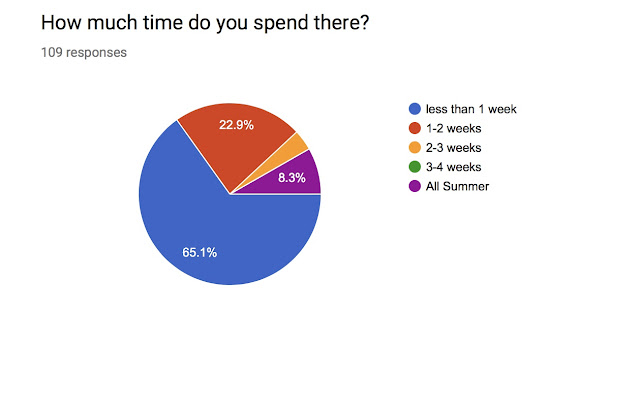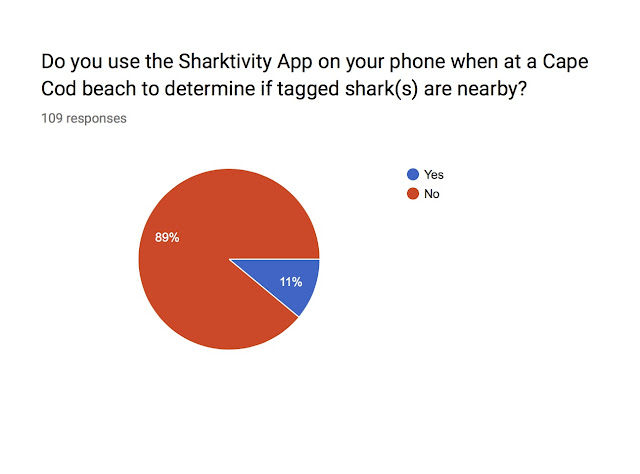A key element to my year long research is to collect data from the public based on their perceptions and opinions as well as research from scientists and environmentalists. Therefore, for this week's blog I decided to set up a survey for Sutton Memorial High School, asking students and faculty (who vacation on the Cape in the summer) as to how they're opinions on White Sharks has changed in response to recent shark attacks along the Cape. Sutton is a small town in Central Massachusetts. This is a unique location for this survey. Over an hour to the closest entrance to the ocean, but a good majority of us visit the Cape every summer, like many towns in New England.
The idea for this survey was to understand public perception of the recent attacks and fatality. I wanted to learn what parts of Cape Cod people were most visiting and if the surge in White Sharks in the region of Cape Cod had any effect on them. Given the media coverage of White Shark attacks and recent fatality I wanted to determined how it effected vacationers. In some cases, Great Whites may tend to congregate in one particular area more than others, and depending on how deep people go into the water, that may have an affect on their vulnerability to these apex predators.

My survey resulted in collecting 109 submissions. Of the 109 submitted entries, 74 of those vacation on Cape Cod. These results showed that most people aren't as afraid of sharks as you might think. Surprisingly a large percentage chose to go deeper than waist-level in the ocean. Another surprise was the casualness in thought as pertaining to White sharks before entering the water. While the majority did give it some consideration (5), I had expected the scale to be higher in the fear columns. When I asked as to whether their fear of swimming in the ocean had changed after the recent shark fatality, the responses were divided pretty evenly, with about half saying their fear increased, and the other half saying that it had no effect on them.
From the data on the Sutton residents who vacation on the Cape, the Lower Cape and Outer Cape represented the minority. These areas are where most of these attacks have been occurring. You would think that the reason for these attacks in certain areas would be due to the fact that so many people are congregating in that particular area. But these charts prove otherwise.

A easy resource, while not fool-proof, is the Sharktivity App. By downloading this app, one can check to see if any tagged White Sharks are in the vicinity. While this is not going to show the potential for hundreds of other White Sharks that frequent Cape Cod, the 5 year study by Dr. Greg Skomal and the Atlantic White Shark Conservancy has managed to tag 18 sharks this season and 150 (at last count) since 2009. The importance of this study has many components, but the importance of human safety is upmost.

A easy resource, while not fool-proof, is the Sharktivity App. By downloading this app, one can check to see if any tagged White Sharks are in the vicinity. While this is not going to show the potential for hundreds of other White Sharks that frequent Cape Cod, the 5 year study by Dr. Greg Skomal and the Atlantic White Shark Conservancy has managed to tag 18 sharks this season and 150 (at last count) since 2009. The importance of this study has many components, but the importance of human safety is upmost.
However, my theory about the public being uneducated about these animals is proven true through my last question. "On a scale of 1-10, how much do you know about the importance of conservation of Great White Sharks?" More than 20% of people said 1 for their answer, implying that they're virtually unaware about the importance of Great White Sharks toward the environment.
The importance of the presence of sharks in our waters is an important and positive element to the health of the oceans ecosystem, but equally so, the need to address education of how to coexist and take the necessary precautions in their habitat and treat them with the respect they deserve.
Going forward, my main objective is continuing to educate my audience on the importance of White Shark conservation as well as the current climate and events that White Sharks have on Cape Cod.







No comments:
Post a Comment